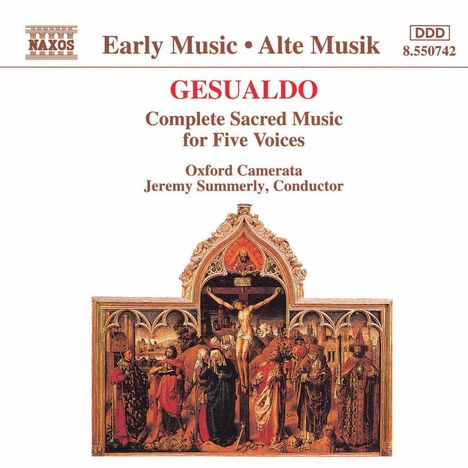Carlo Gesualdo von Venosa: Sacrarum Cantionum quinque vocibus (Liber primus 1603) auf CD
Sacrarum Cantionum quinque vocibus (Liber primus 1603)
Herkömmliche CD, die mit allen CD-Playern und Computerlaufwerken, aber auch mit den meisten SACD- oder Multiplayern abspielbar ist.
- Künstler:
- Oxford Camerata, Jeremy Summerly
- Label:
- Naxos
- Aufnahmejahr ca.:
- 1992
- Artikelnummer:
- 6895446
- UPC/EAN:
- 4891030507425
- Erscheinungstermin:
- 11.11.1993
- Serie:
- Naxos Early Music Collection
Don Carlo Gesualdo, Prinz von Venosa, Graf von Conza, war ein Mörder; er war auch einer der faszinierendsten Komponisten seiner Generation. Diese beiden Aussagen sind notwendigerweise miteinander verbunden: Das erhaltene Bild einer gequälten Seele, die nach dem Mord an seiner Frau einzigartige Musik schreibt, ist ein starkes Bild. Aber die Behauptung, dass Gesualdos offensichtlicher Zustand des psychischen Ungleichgewichts seine grundlegende musikalische Kompetenz beeinträchtigte, ist sowohl irreführend als auch unfair.
Es ist daher schwierig, sich in Gesualdos gesamtes Werk einzufühlen, da es mit selbstbewussten Manierismen gespickt ist, die das Ergebnis psychologischer Selbstquälerei sind: Es ist leicht, sich von den oberflächlicheren Elementen der Musik blenden zu lassen. Aber Gesualdos grundlegender Stil ist ebenso kompetent wie der von Palestrina oder Monteverdi; ohne eine solide kontrapunktische Technik wären die extremeren Gesten nicht so wirkungsvoll wie sie zweifellos sind. Jeder frühbarocke Komponist wäre sicher stolz darauf gewesen, die Motetten "Peccantem me", "Laboravi" oder "O vos omnes" geschrieben zu haben, während das Stillleben "O crux benedicta" ein beispielloses Modell des Sprachflusses der Spätrenaissance ist.
Product Information
Don Carlo Gesualdo, Prince of Venosa, Count of Conza, was a murderer; he was also one of the most intriguing composers of his generation. These two statements are necessarily interrelated: the received image of a tortured soul writing idiosyncratic music in the aftermath of his wife's homicide is a powerful one. But to suggest that Gesualdo's evident state of mental unbalance affected his fundamental musical competence is both misleading and unfair.
It is difficult therefore to empathize with all of Gesualdo's work, peppered as it is with self-conscious mannerisms that are the result of psychological self-torture: it is easy to be blinded by the more superficial elements of the music. But Gesualdo's basic style is as competent as that of Palestrina or Monteverdi; without a sound contrapuntal technique the more extreme gestures would not be as effective as they undoubtedly are. Any early-Baroque composer would surely have been proud to have written the motets 'Peccantem me', 'Laboravi', or 'O vos omnes', while the still life 'O crux benedicta' is an unparalleled model of late Renaissance fluency.
Disk 1 von 1 (CD)
Sacrarum Cantionum Liber Primus
-
1 Illumina faciem tuam
-
2 Deus refugium et virtus
-
3 Exaudi Deus deprecationem meam
-
4 Tribulationem et dolorem
-
5 Tribularer si nescirem
-
6 Precibus et meritis beatae Mariae
-
7 O crux benedicta
-
8 O vos omnes
-
9 Dignare me laudare te
-
10 Maria mater gratiae
-
11 Laboravi in gemitu meo
-
12 Ave dulcissima Maria
-
13 Domine ne despicias
-
14 Peccantem me quotidie
-
15 Sancti Spiritus Domine
-
16 Hei mihi Domine
-
17 Venit lumen tuum Jerusalem
-
18 Reminiscere miserationum tuarum
-
19 Ave Regina coelorum
Mehr von Carlo Gesualdo ...
-
Carlo Gesualdo von VenosaMadrigali a cinque voci Libro IIICDVorheriger Preis EUR 19,99, reduziert um 0%Aktueller Preis: EUR 7,99
-
Carlo Gesualdo von VenosaMadrigali a cinque voci Libro IICDAktueller Preis: EUR 19,99
-
Monteverdi Choir - Bruckner & Gesualdo (Echoing across the Centuries)CDAktueller Preis: EUR 19,99
-
Les Cris de Paris - Strana armonia d'amore (Madrigale a quattro, cinque e sei voci)CDAktueller Preis: EUR 19,99






